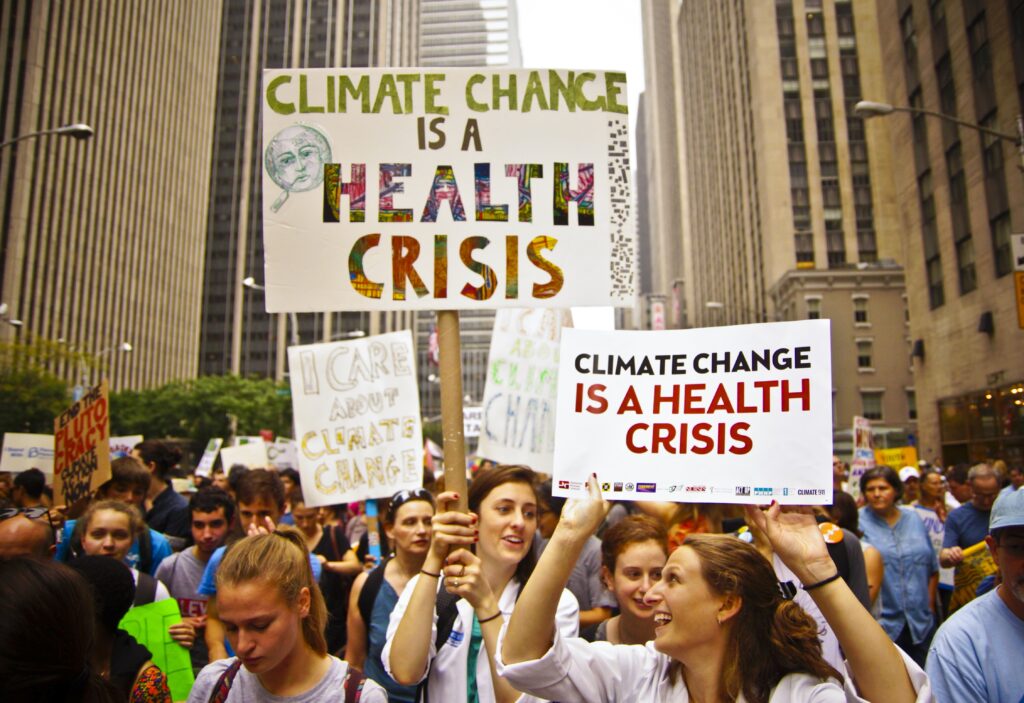WHO Calls for Regulatory Support to Make Pharma Sector More Climate-Friendly
4 Mins Read
In its bid to reduce the climate footprint of the medical industry, the World Health Organization has issued a call for action to fuel sustainability in the pharmaceutical sector.
New standards, a digital transformation and more collaborative regulatory procedures for pharmaceutical companies are among the steps policymakers need to take to greenify the medical sector, according to the World Health Organization (WHO).
Through its Department of Regulation and Prequalification, the global health authority is calling on regulators to establish new standards to enable a “quick and supported transformation” of the medical products industry.
In the document titled ‘Greener pharmaceuticals’ regulatory highway’, the WHO notes how climate change is a major threat to human health, jeopardising progress in development, global health, and poverty reduction, and creating new health risks disproportionately affecting the most vulnerable communities.
A quarter of all deaths and disease burden globally are caused by known avoidable climate risks. On top of that, modern health systems are responsible for 5% of global carbon emissions, including through the entire supply chain, from product manufacturing and distribution to use, waste creation and disposal. This is what makes it so important for the industry to be transformed into a more sustainable operation.
A three-step plan for a greener pharma sector

“Addressing the environmental impact of healthcare products is no longer optional – it is imperative,” said Dr Yukiko Nakatani, WHO assistant director-general for access to medicines and health products.
The UN body is calling on healthcare regulatory bodies and stakeholders to adopt innovative eco-friendly practices, and has laid out three key proposals for the same.
New standards and guidance documents to support these approaches in the manufacturing, distribution and use of medical products are imperative, helping contribute to significant reductions in their emissions. This will also improve sustainability within the health industry and demonstrate the co-benefit of these interventions on public health.
The WHO is also advocating for a digital transformation of all regulatory services to set up standards for adequate reliance mechanisms between regulators on the exchange of relevant information, including a strong support programme for capacity building in low- and middle-income countries.
Moreover, procedures that allow regulators to get involved earlier to help consider innovative approaches will help too. This would support the streamlining of regulatory reviews for new products that have a lower climate impact.
“The transformation of regulatory practices will be pivotal in shaping a pharmaceutical industry that meets today’s health needs without compromising the planet’s future,” said Nakatani.
The WHO states that the pharma sector can lower its environmental threat by adopting cleaner production techniques, redesigning synthetic processes, and investing in renewable energy for manufacturing, in addition to greater supply chain transparency and greener procurement standards.
Sustainable pharma practices to be discussed at 2025 summit

A review of 10 key health products by global health initiative Unitaid last year found that materials acquisition, pre-processing, and manufacturing accounted for about 95% of their greenhouse gas emissions. In fact, active pharmaceutical ingredients (APIs) alone made up 70% of these emissions.
The evidence reveals the need for investment in R&D for greener API manufacturing, as well as more sustainable packaging, transportation, and procurement standards, the WHO says.
Its call for action aligns with other major frameworks, like its Global Strategy on Health, Environment, and Climate Change, and is boosted by global agreements like the COP28 Declaration, in which 140 countries pledged to promote climate-resilient and low-carbon health systems.
As part of proposals for the UN plastics treaty, which sought to curb plastic pollution and phase out plastics, the WHO floated the idea of delaying prohibitions on plastics and polymers that are essential for affordable health services, instead of an exemption for the industry. This, it argues, would leave room for the development and regulation of sustainable alternatives in the meantime. But world leaders failed to reach an agreement on the draft during the final rounds of discussions in South Korea this month.
The WHO says innovation in the pharma sector necessitates the engagement of regulators with active measures that would enable suitable timelines for the adoption of greener approaches. It will work with stakeholders from the regulatory, public health and industrial areas to publish a white paper on sustainable pharma practices, set to be discussed at a global summit in late 2025.
“Health systems should lead by example in mitigating environmental impact,” said Dr Rogerio Gaspar, WHO director for Regulation and Prequalification. “This initiative will catalyse the global transformation required to align health sector operations with sustainability goals. It represents a critical step toward a greener, healthier future.”
In addition to regulatory reform, the WHO is also supporting the European Network on Climate & Health Education, a 25-university network to train medical students to deal with the disease impacts of the climate crisis, which could kill 450,000 Europeans every year even if the world keeps temperature hikes under 1.5°C (an increasingly unlikely possibility).



